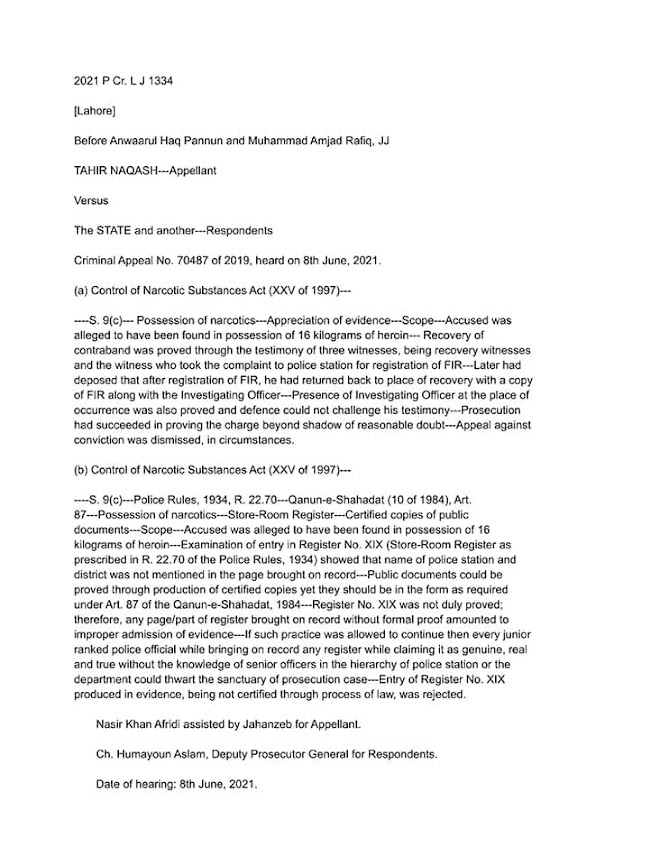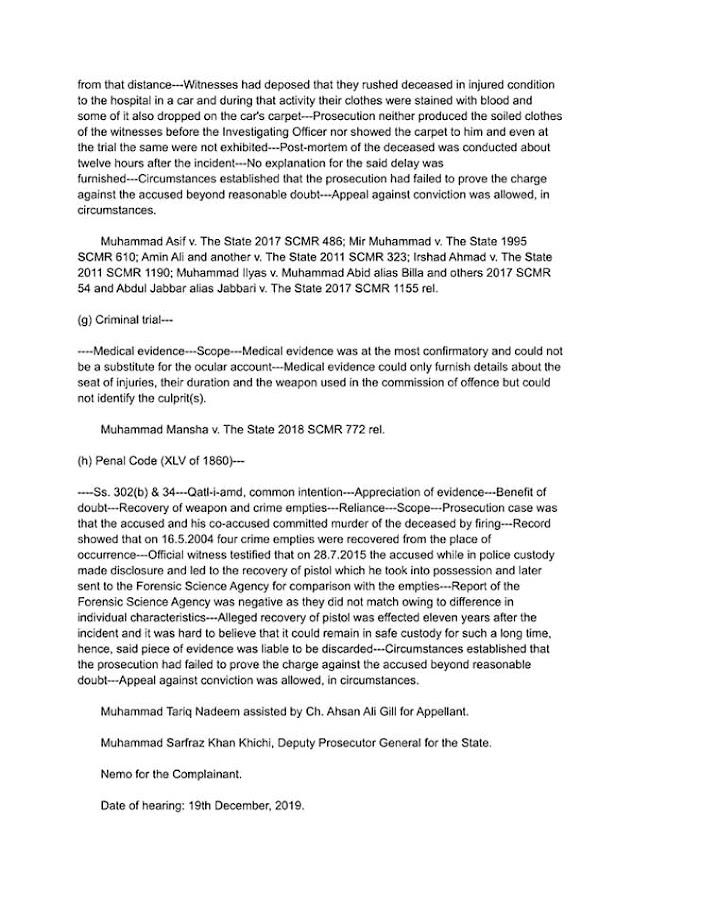2021 PCr.LJ 449
(a) Criminal trial---
----Res judicata, principle of---Applicability in criminal cases---Scope---Principle of res judicata, which was generally understood with reference to civil law, had also been extended to criminal proceedings---When ordinary appellate remedies had been exhausted, or the prescribed time for filing any appeal had expired, a conviction or acquittal was to be regarded as irrevocable, as a result, a person's acquittal could not be subsequently challenged in other proceedings by adducing evidence that he was in fact guilty of the offence of which he was acquitted.
b) Criminal Procedure Code (V of 1898)---
----S. 403---Constitution of Pakistan, Art. 13---Double punishment---Rule of double jeopardy---Scope---Second trial---Prohibition---Scope---Analysis of S. 403, Cr.P.C.---Conditions to be fulfilled when second trial barred, enumerated.
Analysis of section 403, Cr.P.C. evinces that second trial would be barred when the following conditions are fulfilled:-
(i) the accused must have been previously tried by a Court of competent jurisdiction;
(ii) there must have been a hearing and determination on merits and he must have been convicted or acquitted;
(iii) the conviction or acquittal recorded in the previous trial remains in field;
(iv) the parties in the two trials must be the same;
(v) the fact-in-issue in the earlier trial must be identical with what is sought to be re-agitated in the subsequent trial.
(vi) the second trial is not in respect of any distinct offence for which a separate charge might have been framed in the previous trial under section 235(1), Cr.P.C.; and
(vii) the dismissal of a complaint, the stopping of proceedings under section 249, Cr.P.C. or the discharge of the accused does not constitute acquittal and does not bar second trial.
(c) Penal Code (XLV of 1860)---
----Ss. 302(b) & 34---Criminal Procedure Code (V of 1898), Ss. 200 & 345---Qatl-i-amd, common intention---Appreciation of evidence---Benefit of doubt---Private complaint---Compounding of offence---Procedure---Prosecution case was that the accused and unknown co-accused simultaneously fired at deceased/Policeman---Motive behind the occurrence was a property dispute---Complainant in his private complaint, filed application under S. 248, Cr.P.C., stating that a compromise between the parties had been effected owing to which he wanted to withdraw his private complaint and had no objection if the accused were acquitted---Complainant was allowed to withdraw the complaint and the Court acquitted the accused and his co-accused---Validity---Section 248, Cr.P.C. titled as "Trial of summons cases by Magistrates" did not apply to trials by the Court of Session which were conducted under Chapter XXII-A, Cr.P.C.---Order of the Trial Court was patently illegal and without jurisdiction---Criminal case could only be compounded in the manner provided in S. 345, Cr.P.C.---Offence under Ss. 302/34, P.P.C., could be compounded by the legal heirs of the deceased with the permission of the court before which the prosecution was pending---Withdrawal of private complaint was a unilateral act while composition of offence required participation of the other party---Court could not grant the permission envisaged in S. 345, Cr.P.C., in a vacuum and it had to satisfy itself about the genuineness of the compromise and the legal capacity of those who were making it---Unilateral statement of the complainant that he promised with the accused was not sufficient---In the present case, impugned order proceeded on the solitary statement of complainant---No evidence of valid compromise between the legal heirs of deceased and the accused was available---Admittedly, private complaint was still at the initial stage when the complainant withdrew it---Although charge was framed but the statement of not a single witness was recorded and unless the accused had been acquitted after regular trial the second prosecution was not barred.
(d) Penal Code (XLV of 1860)---
----Ss. 302(b) & 34---Qatl-i-amd, common intention---Appreciation of evidence---Benefit of doubt---Delay of about one hour and forty minutes in lodging the FIR---Effect---Record showed that the incident in which deceased was killed took place during the night at 11:30 p.m.---First Information Report was registered on the complaint of complainant (since dead) the same night at 1:10 a.m.---Since the police station was just two furlongs from the place of occurrence, it was by no means prompt---Circumstances established that the prosecution had failed to prove the charge against the accused beyond reasonable doubt---Appeal against conviction was allowed, in circumstances.
(e) Penal Code (XLV of 1860)---
----Ss. 302(b) & 34---Qatl-i-amd, common intention---Appreciation of evidence---Benefit of doubt---Prosecution case was that the accused and co-accused committed murder of the deceased by firing---Motive behind the occurrence was a property dispute---Record showed that the prosecution did not produce any evidence to prove the alleged motive except a bald statement of a witness---Prosecution could have examined the original owner of the property and adduced the relevant sale deed/mutation if the transaction was documented but it did not do so---An adverse presumption could be drawn against prosecution under Art. 129(g) of Qanun-e-Shahadat, 1984, in circumstances, that the prosecution had failed to prove the motive---No direct motive was attributed to the accused---Prosecution had failed to prove the charge against the accused beyond reasonable doubt, in circumstances--- Appeal against conviction was allowed, in circumstances.
(f) Penal Code (XLV of 1860)---
----Ss. 302(b) & 34---Qatl-i-amd, common intention---Appreciation of evidence---Benefit of doubt---Chance witnesses having no justification for presence at the place of occurrence---Effect---Prosecution case was that the accused and co-accused committed murder of the deceased by firing---Motive behind the occurrence was a property dispute---Record showed that the complainant passed away before the commencement of trial---Prosecution, therefore, produced cousins and brother-in-law of the complainant respectively and deposed in line with the complaint and FIR, however, there were a number of factors which impinged on their credibility and made their presence at the crime scene at the relevant time extremely doubtful---Claim of witnesses that on the night of occurrence they had gone to house of deceased to attend a Panchayat convened for resolution of the dispute was doubtful---Both the witnesses worked at petrol stations and admitted that they had long working hours which often extended till late in the night, they were, thus, chance witnesses---Statements of the said witnesses under S. 161, Cr.P.C., were recorded with unexplained delay---Prosecution had not produced any person from house of deceased who was a natural witness, thus, best evidence was withheld and adverse inference could be drawn against the prosecution on that score---Scaled site plan and medical evidence contradicted with regard to the distance from which the accused and his co-accused fired at deceased---Site plan showed that the distance was 25 feet while the post-mortem report showed blackening and tattooing on most of the injuries---Said injuries were not possible from that distance---Witnesses had deposed that they rushed deceased in injured condition to the hospital in a car and during that activity their clothes were stained with blood and some of it also dropped on the car's carpet---Prosecution neither produced the soiled clothes of the witnesses before the Investigating Officer nor showed the carpet to him and even at the trial the same were not exhibited---Post-mortem of the deceased was conducted about twelve hours after the incident---No explanation for the said delay was furnished---Circumstances established that the prosecution had failed to prove the charge against the accused beyond reasonable doubt---Appeal against conviction was allowed, in circumstances.
(g) Criminal trial---
----Medical evidence---Scope---Medical evidence was at the most confirmatory and could not be a substitute for the ocular account---Medical evidence could only furnish details about the seat of injuries, their duration and the weapon used in the commission of offence but could not identify the culprit(s).
(h) Penal Code (XLV of 1860)---
----Ss. 302(b) & 34---Qatl-i-amd, common intention---Appreciation of evidence---Benefit of doubt---Recovery of weapon and crime empties---Reliance---Scope---Prosecution case was that the accused and his co-accused committed murder of the deceased by firing---Record showed that on 16.5.2004 four crime empties were recovered from the place of occurrence---Official witness testified that on 28.7.2015 the accused while in police custody made disclosure and led to the recovery of pistol which he took into possession and later sent to the Forensic Science Agency for comparison with the empties---Report of the Forensic Science Agency was negative as they did not match owing to difference in individual characteristics---Alleged recovery of pistol was effected eleven years after the incident and it was hard to believe that it could remain in safe custody for such a long time, hence, said piece of evidence was liable to be discarded---Circumstances established that the prosecution had failed to prove the charge against the accused beyond reasonable doubt---Appeal against conviction was allowed, in circumstances.






















0 Comments